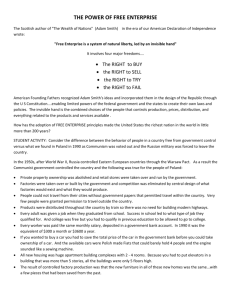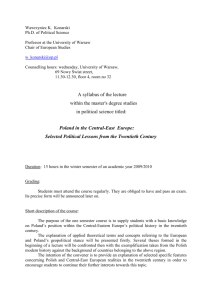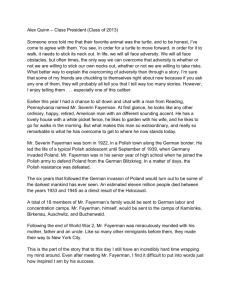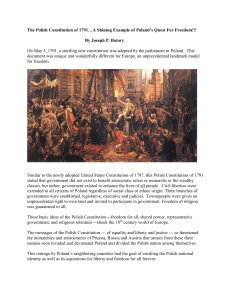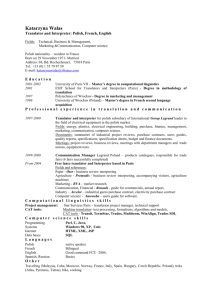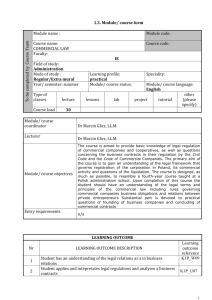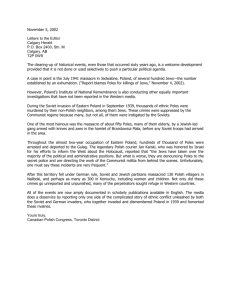bishop duffy of buffalo speaks on poland
advertisement
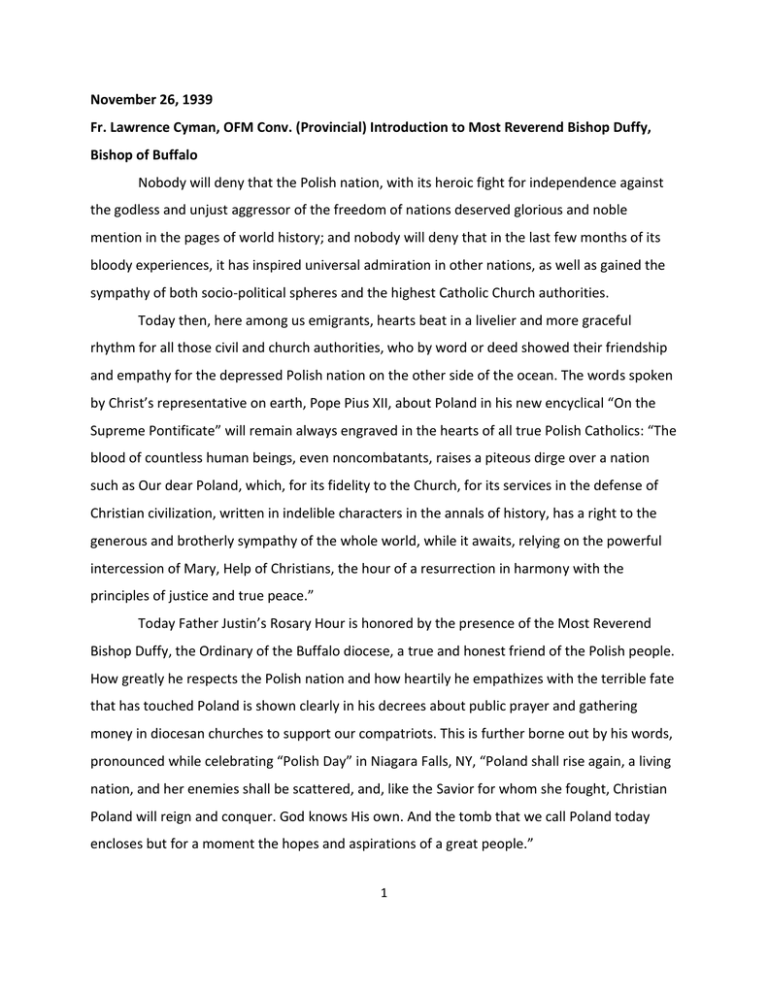
November 26, 1939 Fr. Lawrence Cyman, OFM Conv. (Provincial) Introduction to Most Reverend Bishop Duffy, Bishop of Buffalo Nobody will deny that the Polish nation, with its heroic fight for independence against the godless and unjust aggressor of the freedom of nations deserved glorious and noble mention in the pages of world history; and nobody will deny that in the last few months of its bloody experiences, it has inspired universal admiration in other nations, as well as gained the sympathy of both socio-political spheres and the highest Catholic Church authorities. Today then, here among us emigrants, hearts beat in a livelier and more graceful rhythm for all those civil and church authorities, who by word or deed showed their friendship and empathy for the depressed Polish nation on the other side of the ocean. The words spoken by Christ’s representative on earth, Pope Pius XII, about Poland in his new encyclical “On the Supreme Pontificate” will remain always engraved in the hearts of all true Polish Catholics: “The blood of countless human beings, even noncombatants, raises a piteous dirge over a nation such as Our dear Poland, which, for its fidelity to the Church, for its services in the defense of Christian civilization, written in indelible characters in the annals of history, has a right to the generous and brotherly sympathy of the whole world, while it awaits, relying on the powerful intercession of Mary, Help of Christians, the hour of a resurrection in harmony with the principles of justice and true peace.” Today Father Justin’s Rosary Hour is honored by the presence of the Most Reverend Bishop Duffy, the Ordinary of the Buffalo diocese, a true and honest friend of the Polish people. How greatly he respects the Polish nation and how heartily he empathizes with the terrible fate that has touched Poland is shown clearly in his decrees about public prayer and gathering money in diocesan churches to support our compatriots. This is further borne out by his words, pronounced while celebrating “Polish Day” in Niagara Falls, NY, “Poland shall rise again, a living nation, and her enemies shall be scattered, and, like the Savior for whom she fought, Christian Poland will reign and conquer. God knows His own. And the tomb that we call Poland today encloses but for a moment the hopes and aspirations of a great people.” 1 Address about Poland by Most Reverend Bishop Duffy, Bishop of Buffalo I am deeply grateful for the invitation to address the Radio listeners of the Rosary Hour. It is a source of sincere pleasure to share in the work of an organization that has accomplished so much in developing a spirit of love of Poland and devotion to Catholic ideals and principles. During the lifetime of your society, you have made your fellow American citizens aware of Polish culture, and of the arts hat have made the homeland of your fathers the center of Western Civilization on the eastern borders of Europe. We meet today at a tragic moment in the history of Poland. The democratic government established there at the close of the last war has been crushed by brute force and the land itself divided between a pagan idea and an atheistic power. For the fourth time in its long history, Poland, the most eastern outpost of Christian civilization, has had to fight in defense of Church and civilization. For the moment the brute force of arms holds Poland in subjection, but no one familiar with the long view of history and whose confidence rests in the Providence of God, has the slightest fear that the Polish nation will fail to rise again in new splendor and greater power. In every generation since the Crucifixion, individuals and nations have had to bear in their bodies the wounds of Christ. The sacred Stigmata are the evidence of God’s special love for the individual or nation chose to exemplify His suffering. Were I to choose a picture to exemplify the history of Poland today, I would turn your eyes to the familiar Stations of the Cross. Study them one by one and find in each the sufferings of Christ, and transfer what He bore to Poland’s agony. Christ was condemned to die on the Cross. Every element of that trial, the judge and his decision, exemplifies by analogy the trial and condemnation of Poland. The heavy Cross, the scourging, Christ stripped of His garments, the wounds in the hands and feet and side, find their records in the daily story of what the great Polish nation has had to endure. Then the end. The body of Christ against which men no longer had any power enclosed in the tomb, and those who loved Him best weeping tears of agony, withdrawn to their desolated homes. Into that tomb with Jesus went the sweetest hopes and the fondest dreams of a little company of loved 2 ones. They felt that the very words of Christ, “it is finished,” applied with tragic meaning to themselves.. Men and women of your blood have, by their strength, entered into every department of public and professional life. Within the short space of 40 or 50 the outstanding names in our country’s progress are those of distinctly Polish origin. Poland’s contribution to American life has been strength and courage. You have given it generously but received it from Poland and now the ancient home land asks you to return that strength and courage in her hour of need. Your leaders will work out a method by which the Polish revival may be accomplished. It is hard for a nation to see the things it gave its life to broken and to stoop and build them up again with broken tools. The men and women and the children of the Polish Republic turn rightfully to the 5,000,000 men and women of Polish blood in the United States and Canada and ask them to be their support, their strength and their courage in this moment of disaster. The Polish government is not dead; it exists in Paris and is represented in London, in Washington and in Stockholm. The free nations of the world maintain that though Poland is held for the moment by the brute force of arms, that while the territory is gone for the time being, the government itself survives. It is for you Americans of Polish descent to repay with interest Poland’s gift of strength and courage to this nation. Keep alive in your heart the words of your National Anthem, teach them to your children and work toward the day when once more Poland shall rise from its ashes a great and free nation. You cannot fail in this grand endeavor, for Poland has not been lost as long as you live. Your fellow Catholics in America stand with you in solid unity. The Catholic Bishops of the U.S. in their meeting last week express these sentiments of every Catholic. Let me read their inspiring words: “The Bishops of the United States, mindful of the staunch faith and bloodstained valor of the Church in Poland, voice their brotherly compassion with the Polish Hierarchy; its clergy and people in this its hour of bitter sorrow. Like a mighty champion this noble Christian people has stood at the outpost of Christian Europe to witness and defend the Cross. Only yesterday amidst the mysterious changes of the times the Cross in Poland seemed 3 the bulwark of western Christian traditions against upsurging atheistic hordes. Like darkness came to Calvary, sorrow and suffering have settled on the church in Poland. As our Holy Father says: ‘The blood of countless human beings, even non-combatants, raise a piteous dirge over a nation such as our dear Poland, which for its fidelity to the Church, for its defense of Christian civilization, written in indelible characters in the annals of history, has a right to the generous and brotherly sympathy of the whole world, while it awaits, relying on Mary, Help of Christians, the hour of a resurrection in harmony with the principles of justice and true peace.’ Poland’s faith, which Divine Providence wills to appear more lustrous in storm and tempest, looks confidently to an approaching Easter Morn of Peace in justice and charity. We, the Bishops of the United States, extend our sympathy to our brothers of the Episcopate of Poland. We shall not forget them and their flocks in our charity and with our people we suppliantly beg the Virgin of Czestochowa to bring peace and succor to the suffering in Poland and once more confound the world by making the blood-stained Cross, the portent of new triumphs for Christ, Our King.” The hope of a re-birth of Poland is not mere wishful thinking. The spirit of the Polish people – their courage and strength is the source of our coincidence in a new and greater Poland. The opening words of the Polish national song, express the undying spirit of the Polish people. But long before the establishment of the Polish Republic the famous words which I have quoted were spoken by prisoners in the Bastiles of Russia and Prussia and Austria. They were chanted by the oppressed workers of Poland as they labored in the fields of their homeland. The scattered people of Polish blood in America and Canada taught the sentiment to their children and the undying hope of Poles everywhere was the fulfillment of the prayer and the promise – ‘Poland has not been lost as long as we live.’ We are met here today to repeat these words again and to pledge ourselves once more to the rebuilding of a free and independent Poland. All that those who still live under tyranny in Polish lands can accomplish is to keep the dream vivid in their minds. They look, and they have a right to look, to those of Polish blood in other lands to labor to make the dream come 4 true once more. To no country do they look with more anxious hop than to America and to the citizens of this nation of Polish blood. The United States owes a debt to the Polish race that it never can repay. The citizens of Polish blood were endowed by a quality of strength that separated them from almost every other type in American life. The physical strength of the Pole has been the marvel of all our people. The mines of Pennsylvania, the wheat fields of the West, the foundries of the nation have lived and prospered on Polish strength. They took the raw material from the soil and with their naked hands poured it into crucibles and furnaces and wrought the steel that has entered into the industrial life of the nation. Not a railroad system that spans the continent, no towering building whose cupola seems to touch the sky but has profited by the industrial development of America and claim with pride, “Of all this my people have been a great part.” Not physical strength alone but that greater moral strength that makes a nation has been the contribution of Polish blood to American life. The Polish home, happy, contented, clean; the Polish family, united in the bonds of affection are examples of the moral fiber and strength of your people. The story of religion could not be adequately told without long and detailed expression of the Polish love for God and the religious life. You have built your churches in every city and almost every village of the Western World and with your church the Christian school where virtue and strength were added to your other contributions to American life and government. And yet in three days, the door of the tomb is opened and the glorious and triumphant Savior rose not only to live but to rule and conquer. God knows his own. And the tomb that we today call Poland encloses but for a moment the hopes and aspirations of a great people. In God’s good time the purposes of Providence will be revealed. For while God’s ways are not our ways, His Providence always rules the world. Poland shall rise again, a living nation, and her enemies shall be scattered, and like the Savior for whom she fought, Christian Poland will reign and conquer. Additional Talk by Fr. Konrad Wawrzyńczak, OFM Conv, Guardian of Friary in Krośno 5 Throughout its history, the Polish nation was always distinguished by an incredible loyalty to the Catholic religion, and through this always addressed the highest head of the Church, who is Christ’s representative on earth, with the deepest respect and love. The expression of this respect and love which the nation felt for the Holy See were, for instance, different celebrations and ceremonies which so often, in honor of the Holy Father, were organized in all of Poland. Poles wanted, in this way, on every possible occasion, to manifest their sincere and warm feelings for him. It is an understandable thing also that every Polish government, being in a sense the vector expressing the moods of society, treated the Pope with equal sympathy and generosity. The best evidence of this, I think, were the frequent telegrams sent as homage by the Polish government to the Holy See, always underlining their deep loyalty to the Catholic faith. Vice versa, the Holy Father in his replies always expressed great joy at this fact, calling Poles his beloved nation. This warm thread tying Poland to the Apostolic See become ever tighter any time our country found itself in danger, or lost its independence, going into slavery at the hands of “foreign” oppressors. Then the Holy See would become one of her most ardent defenders. We could see this even during the last events which befell our poor Fatherland. The defeat that our country suffered touched perhaps most deeply the heart of the Holy Father, Pius XII. The pain he felt because of this was even greater because he had to watch as a nation Catholic through and through, a nation serving as the bulwark and the mainstay of the Church in the East, lay smothered by two enemies of God and the Church. We Poles, all without exception knew that in these difficult moments the Pope was with us, that our fate touched him most deeply, we knew that he would not let pass the smallest opportunity to give us his helping hand. This certainty stuck and sticks in the heart of each Pole. How touching it was to see the crowds of Poles, who disregarding danger flocked to churches and besieged confessionals in order to confess the sins of their whole life. They died in thousands from the German bombs, but they died with prayers on their lips. It is hard to describe this religious fervor which was visible in those who were most touched by fate. It was enough if in their misery they saw a Polish, Catholic priest, and they ran to him like children, forgetting about the danger of the situation. How many times we heard that our priests, while rushing with spiritual help to those in need, 6 experienced supernatural respect and adoration. Their hands and clothes were kissed, they were told words of gratitude, they were blessed. The more unhappiness there was, the more faith there was. This faith fills our hearts even now. We believe that God has only temporarily tested us and that the dawn of freedom will again show itself to us. This faith is held by our whole nation, so no one can claim that we are spiritually despondent. Certain people, not knowing the true situation, judge us by saying that the disaster which has struck our nation will shake our holy faith and make us distance ourselves from the Holy Church. But it is the opposite, our faith has grown and become strengthened. It has become the guiding star from which our nation gathers strength and endurance. We believe, because we are told to believe by the multi-century history of our nation and all of those disasters and experiences which accompanied it in its march through history. We also believe that the Holy See, as well as the Holy Father who hasn’t missed an occasion so far to show us his empathy and his help, will pray for us, asking the whole world loudly for our rights and proper position. With what emotion we listened to the words of the Pope, who at a special audience at Castel Gandolfo spoke to a group of Poles who had been forced to leave their beloved Fatherland. There were about two hundred of us there. At the head of the group were representatives of the clergy and the Polish media. We saw among them the Polish ambassador to Quirinal, Mr. General Wieniawa Długoszewski, the Polish ambassador to the Vatican, Mr. Pappe, the Consul General in Rome, Mr. Mazurkiewicz, the Primate of Poland Cardinal Hlond, the Jesuit General Father Leduchowski, and many others. The Pope greeted us in a truly paternal way. When we looked at that time at the inspired figure of the Holy Father, at the pain on his face, we all saw what a friend we have in the Pope. “Poland will not die, because it cannot die”, “Who fights for Poland, fights for God”, these words, as if an echo of the Holy Father’s speech, awaken in our hearts the conviction that Poland will not be disappointed in the current pope. Pope Pius XII gave proof of this more than once and gives it until this very day. When for example he found out about the crowds of Polish refugees, among the number of which was a small group of us Franciscans, that they, without any means to live, had taken refuge in neighboring Romania, he immediately gave his Polish nuncio Cortezi the 7 order to take care of our emigrants, giving a substantial amount of money to this cause. As we know Nuncio Cortiez remains in Romania, undoubtedly fulfilling his noble mission in this way. 8

